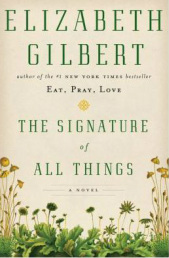
“You see, I have never felt the need to invent a world beyond this world, for this world has always seemed large and beautiful enough for me. I have wondered why it is not large and beautiful enough for others-- why they must dream up new and marvellous spheres, or long to live elsewhere, beyond this dominion... but that is not my business. We are all different, I suppose. All I ever wanted was to know this world. I can say now, as I reach my end, that I know quite a bit more of it than I knew when I arrived. Moreover, my little bit of knowledge has been added to all the other accumulated knowledge of history-- added to the great library, as it were. That is no small feat, sir. Anyone who can say such a thing has lived a fortunate life.”
“I will tell you why we have these extraordinary minds and souls, Miss Whittaker," he continued, as though he had not heard her. "We have them because there is a supreme intelligence in the universe, which wishes for communion with us. This supreme intelligence longs to be known. It calls out to us. It draws us close to its mystery, and grants us these remarkable minds, in order that we try to reach for it. It wants us to find it. It wants union with us, more than anything.”
As soon as I opened the package that contained my copy of The Signature Of All Things a smile crossed my face. The book is extremely beautiful – the colours and the way the pages were cut make it look like it’s old. It’s like it is actually from the eighteenth century, when part of the story is set.
I had read Eat, Pray, Love and Committed and I’m a fan of Elizabeth Gilbert, her life story and her writing style so I couldn’t wait to read her new book.
It’s a very ambitious book, very well researched and exceptionally written. The characters are quickly and strongly imprinted in your mind and you can easily visualize their surroundings.
The author presents us with a rich account of how science, trade, society and beliefs changed during those years (the story goes from late 18th century to late 19th century). It is fun to imagine how people reacted to new discoveries and ideas that are common to us today, like Darwin’s theory of natural selection.
Henry Whittaker was born poor and made his fortune trading plants, manufacturing medicine and investing on expeditions and new discoveries. He married Beatrix, a Dutch woman, and they moved to Philadelphia, where their daughter was born.
Alma is remarkable. Intelligent, dutiful, curious, but a bit self-absorbed. We follow her from the moment she is born. She is faced with conflicting feelings, stiff relationships, loss, new concepts and experiences and so she grows and so the story unfolds.
The book is long (500 pages) but the pace is great. I read it quickly, but sometimes I felt like it dragged on the explanations and descriptions of facts, ideas and theories of that time, like a lecture. However, there’s always something going on and you can’t help but wonder what will happen next.
The Signature Of All Things is a theory that says everything in nature was marked by the Creator. Like God left a series of imprints and clues for us to understand life. This concept is brought into the story by Ambrose Pike, who changes the course of Alma’s life – and of the book.
Captivating story, it really takes you on a journey.
“I will tell you why we have these extraordinary minds and souls, Miss Whittaker," he continued, as though he had not heard her. "We have them because there is a supreme intelligence in the universe, which wishes for communion with us. This supreme intelligence longs to be known. It calls out to us. It draws us close to its mystery, and grants us these remarkable minds, in order that we try to reach for it. It wants us to find it. It wants union with us, more than anything.”
As soon as I opened the package that contained my copy of The Signature Of All Things a smile crossed my face. The book is extremely beautiful – the colours and the way the pages were cut make it look like it’s old. It’s like it is actually from the eighteenth century, when part of the story is set.
I had read Eat, Pray, Love and Committed and I’m a fan of Elizabeth Gilbert, her life story and her writing style so I couldn’t wait to read her new book.
It’s a very ambitious book, very well researched and exceptionally written. The characters are quickly and strongly imprinted in your mind and you can easily visualize their surroundings.
The author presents us with a rich account of how science, trade, society and beliefs changed during those years (the story goes from late 18th century to late 19th century). It is fun to imagine how people reacted to new discoveries and ideas that are common to us today, like Darwin’s theory of natural selection.
Henry Whittaker was born poor and made his fortune trading plants, manufacturing medicine and investing on expeditions and new discoveries. He married Beatrix, a Dutch woman, and they moved to Philadelphia, where their daughter was born.
Alma is remarkable. Intelligent, dutiful, curious, but a bit self-absorbed. We follow her from the moment she is born. She is faced with conflicting feelings, stiff relationships, loss, new concepts and experiences and so she grows and so the story unfolds.
The book is long (500 pages) but the pace is great. I read it quickly, but sometimes I felt like it dragged on the explanations and descriptions of facts, ideas and theories of that time, like a lecture. However, there’s always something going on and you can’t help but wonder what will happen next.
The Signature Of All Things is a theory that says everything in nature was marked by the Creator. Like God left a series of imprints and clues for us to understand life. This concept is brought into the story by Ambrose Pike, who changes the course of Alma’s life – and of the book.
Captivating story, it really takes you on a journey.


